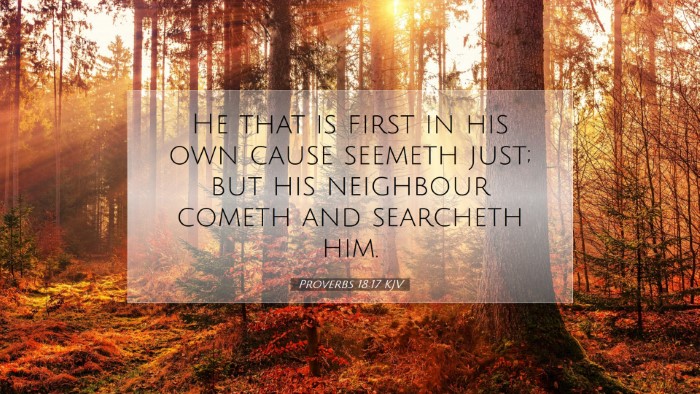Commentary on Proverbs 18:17
Proverbs 18:17 states, "He that is first in his own cause seemeth just; but his neighbor cometh and searcheth him." This verse provides profound insight into human nature, justice, and the complexities of argumentation and perception within interpersonal relations.
Overview of the Verse
In essence, this verse speaks to the nature of advocacy and judgment. It highlights the tendency of individuals to present their own perspectives as just and reasonable, while simultaneously indicating that true justice often requires examination and dialogue.
Insights from Matthew Henry
Matthew Henry emphasizes the temptation to bias when individuals advocate for themselves. He notes that the one who speaks first in any argument often has the advantage, yet this advantage can disguise the truth. This observation urges caution in accepting first impressions and encourages a deeper investigation into claims made by others.
- The Role of Advocacy: Henry suggests that self-advocacy can obscure the truth, as one might present reasoning that appears compelling at first glance but lacks depth upon further scrutiny.
- Call for Discernment: He calls on the listener to practice discernment, emphasizing that justice involves looking beyond initial claims and seeking out the perspectives of others.
Insights from Albert Barnes
Albert Barnes provides additional context and reflections on the dynamics of perception and judgment in this verse. He brings to light the cultural aspects of justice prevalent during the time of the text.
- The First Party's Advantage: Barnes notes that in ancient cultures, the first to present a case was often favored by judges and audiences, which could lead to a miscarriage of justice.
- Importance of Examination: He stresses that the role of a "neighbor" represents those who provide further context or challenge initial assertions, highlighting the communal aspect of discerning truth.
Insights from Adam Clarke
Adam Clarke provides a more detailed analysis of the implications of this verse in a social and relational context. His commentary dives into the psychological aspects of human interaction and civil discourse.
- Human Nature and Conflict: Clarke observes that individuals are inclined to defend their viewpoints vehemently, sometimes leading to conflict and misunderstanding.
- Value of Objectivity: He advocates for objectivity in discussions, suggesting that one should not only consider the vehement claims of one party but also approach the subject with a spirit of inquiry and openness.
Theological Implications
This verse serves as a challenge to the reader, prompting questions about our own communication styles and the justice of our conclusions. It invites reflection on how we engage in discourse and encourages a posture of humility when asserting our cases.
- Self-Reflection: The verse compels believers to consider their motivations when speaking or advocating for themselves, urging them to root out potential biases.
- Community and Accountability: It reinforces the importance of community accountability in discussions, reminding us that other viewpoints have a vital role in comprehensively understanding truth and justice.
Practical Applications
For pastors, students, and scholars, this commentary on Proverbs 18:17 calls for practical applications in both personal and ministerial settings:
- Encouraging Open Dialogue: Leaders should foster environments that allow for open discussion, where all voices can be heard before conclusions are drawn.
- Modeling Discernment: Teaching congregants and students the value of discernment in gospel matters, encouraging them not to take things at face value.
- Promoting Mediation: In instances of conflict or disagreement, individuals should be encouraged to mediate before taking sides, seeking a complete understanding of situations.
Conclusion
Proverbs 18:17 stands as a timeless reminder of the complexities involved in human communication and the nature of justice. By integrating insights from respected commentators such as Matthew Henry, Albert Barnes, and Adam Clarke, we gain a multifaceted understanding of this scripture, equipping us for deeper reflection and more nuanced application in our lives and ministries. As we navigate our relationships and discussions, let us remember the importance of fairness, thorough investigation, and openness to truth beyond the first voice that speaks.


